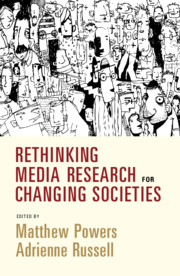Book contents
- Rethinking Media Research for Changing Societies
- Communication, Society and Politics
- Rethinking Media Research for Changing Societies
- Copyright page
- Contents
- Figure
- Contributors
- Acknowledgments
- 1 Introduction
- Part I Living in a Datafied World
- Part II Journalism in Times of Change
- 4 Press Freedom and Its Context
- 5 What Are Journalists for Today?
- 6 Noise and the Values of News
- Part III Media and Problems of Inclusion
- Part IV Engagement with and through Media
- Part V The Role of Scholars
- Other Books in the Series (continued from page ii)
- References
5 - What Are Journalists for Today?
from Part II - Journalism in Times of Change
Published online by Cambridge University Press: 18 September 2020
- Rethinking Media Research for Changing Societies
- Communication, Society and Politics
- Rethinking Media Research for Changing Societies
- Copyright page
- Contents
- Figure
- Contributors
- Acknowledgments
- 1 Introduction
- Part I Living in a Datafied World
- Part II Journalism in Times of Change
- 4 Press Freedom and Its Context
- 5 What Are Journalists for Today?
- 6 Noise and the Values of News
- Part III Media and Problems of Inclusion
- Part IV Engagement with and through Media
- Part V The Role of Scholars
- Other Books in the Series (continued from page ii)
- References
Summary
This chapter considers the question of journalists’ purposes. Matthew Powers and Sandra Vera–Zambrano argue that transformations in media and public life (e.g., distrust in news media, distressed business models) make revisiting the question especially urgent. Where scholars typically answer the question normatively, the authors suggest the question can also be analyzed empirically. Drawing on research in France and the United States, they argue that journalists reproduce and legitimate existing social hierarchies, with individuals from lower middle–class backgrounds producing practical information for popular audiences, while those from upper middle–class backgrounds tending to orient themselves toward civic aims for audiences with higher volumes of economic and cultural capital. They suggest that both the question and this answer can link scholarship on media and public life to a rich array of theoretical debates often ignored in contemporary debates that emphasize chaos, fluidity, and disorder in journalism – long focused on the establishment and maintenance of social order, the hierarchies that these orders legitimate, and the inequalities they help reproduce.
- Type
- Chapter
- Information
- Rethinking Media Research for Changing Societies , pp. 65 - 77Publisher: Cambridge University PressPrint publication year: 2020
References
- 2
- Cited by



